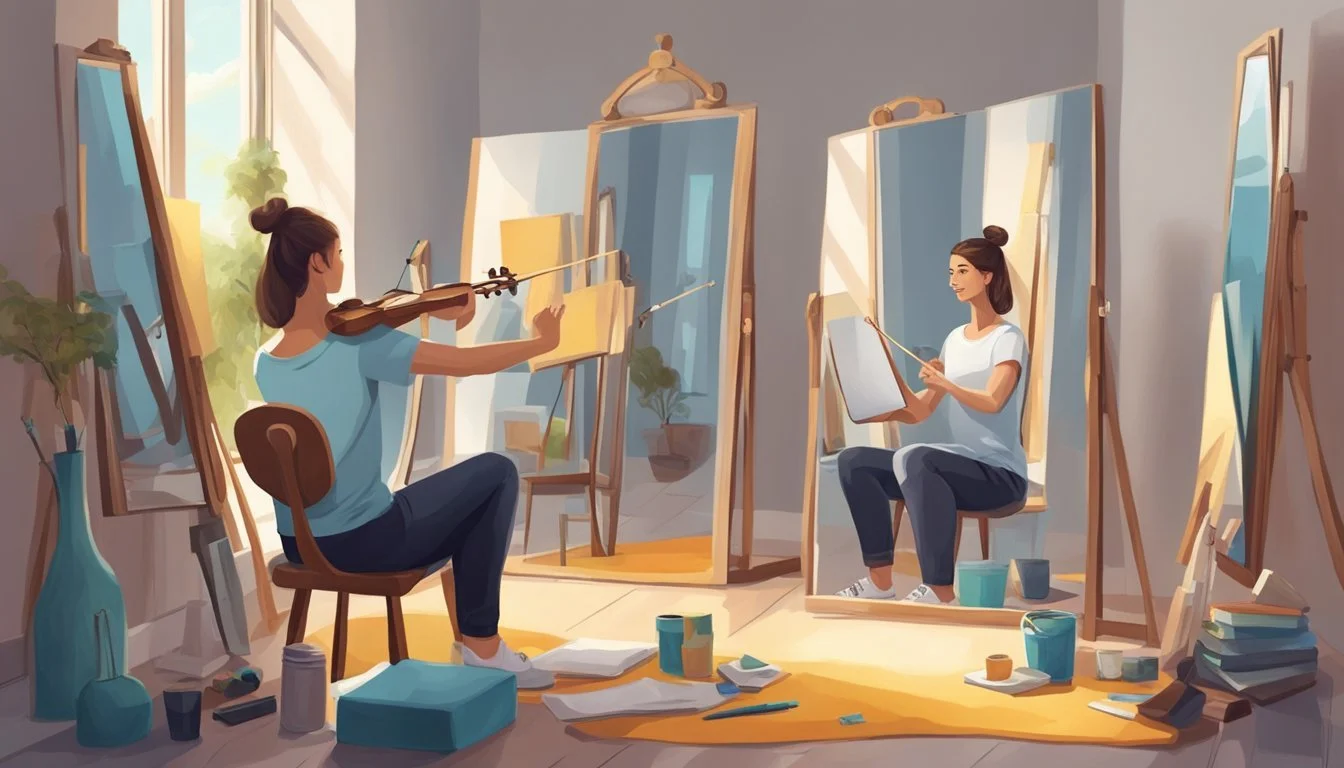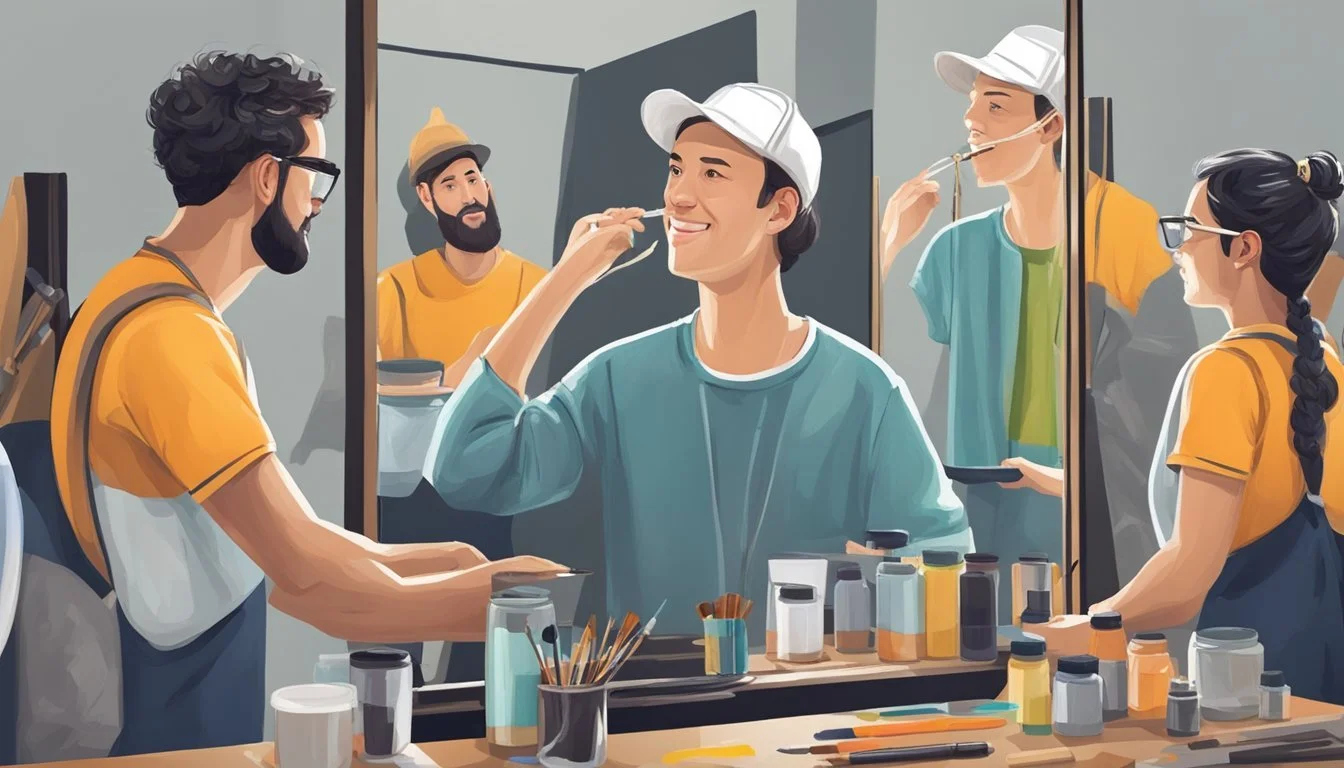13 Common Hobbies of Narcissists
How They Reveal Hidden Traits
Narcissism, characterized by an excessive need for admiration and a lack of empathy, can significantly influence personal interests and hobbies. This article explores various activities that narcissistic individuals typically engage in, shedding light on how their personality traits shape their recreational choices.
Understanding these hobbies can provide valuable insights into the patterns of behavior associated with narcissism. By examining these activities, readers can gain a clearer perspective on how narcissists seek validation and maintain their self-image through their leisure pursuits.
1) Collecting Expensive Art
Narcissists are often attracted to collecting expensive art. This passion aligns with their desire for status and external validation. Art collections can become a symbol of prestige and sophistication, offering them a sense of superiority.
Participating in art auctions provides a platform for narcissists to showcase their wealth and taste. Owning rare and valuable pieces enhances their image in social circles and fosters admiration.
The process of curating a collection allows narcissists to exert control and demonstrate their refined judgment. By selecting specific works, they can craft a narrative that elevates their perceived cultural capital and intellect.
Collecting expensive art also serves as a conversation starter. It opens doors to exclusive social events and elite galleries where they can further bask in the admiration of peers. This hobby is deeply intertwined with their need for recognition and influence.
For more insights, you can visit the article on narcissism and collecting.
2) Gourmet Cooking Classes
Narcissists often pursue gourmet cooking classes as a way to showcase their culinary skills and impress others. These classes provide them with an opportunity to learn sophisticated techniques and create elegant dishes.
Attending gourmet cooking classes allows narcissists to immerse themselves in an environment where they can seek admiration from peers and instructors. They relish the attention and validation that comes from demonstrating their abilities.
In gourmet cooking classes, they prioritize perfecting complex recipes that can be served at social gatherings. Their objective is to be seen as exceptional hosts who can provide unique and high-quality dining experiences.
Narcissists also enjoy the exclusivity associated with gourmet cooking. They often choose high-end classes that emphasize exquisite ingredients and detailed preparations, reflecting their desire for status and superiority.
By mastering gourmet cooking, narcissists position themselves as culinary experts within their social circles. This enhances their social standing and reinforces their self-image.
Instructors and classmates may notice the narcissist's tendency to seek constant praise and dominate group activities. Their motive is not just to learn but to be recognized as the best in the class.
The structured setting of a cooking class offers a stage for narcissists to exhibit control and command, aligning perfectly with their need for dominance.
3) Hosting Lavish Parties
Narcissists often enjoy hosting lavish parties. These gatherings serve as a platform for them to showcase their wealth and status. By throwing extravagant events, they can attract admiration and envy from their guests.
Lavish parties allow narcissists to be the center of attention. They thrive on the admiration and praise received from attendees. This boosts their ego and reinforces their perceived superiority.
These parties often feature expensive decorations, gourmet food, and exclusive entertainment. Narcissists ensure everything is top-notch to impress their guests and highlight their social standing.
In addition to showing off, hosting such events allows narcissists to control the social environment. They can dictate the guest list, activities, and conversations, ensuring everything revolves around them.
For more details on this, you can visit The Shocking Ways Narcissists Manipulate their Partners. This helps them maintain their dominant position and manipulate the perception others have of them.
4) Luxury Shopping Sprees
Narcissists often engage in luxury shopping sprees as a means to validate their self-worth and demonstrate their status. The act of purchasing high-end items offers them a sense of superiority and accomplishment.
These shopping sprees usually involve buying expensive designer clothing, jewelry, and cutting-edge electronics. The focus is not on necessity but on acquiring items that can impress others.
Narcissists derive pleasure from the attention and admiration they receive by flaunting their acquisitions. Luxury shopping allows them to curate an image of success and sophistication.
The thrill of buying exclusive items provides a temporary boost to their self-esteem. This behavior can sometimes lead to compulsive shopping habits, where the act of purchasing becomes an uncontrollable obsession.
Effective communication and empathy are essential when dealing with a narcissist's shopping addiction. Approaching the topic gently and non-confrontationally can make a significant difference in managing this behavior.
5) Personal Styling Sessions
Personal styling sessions are a common hobby for narcissists. These sessions are tailored to enhance their appearance, catering to their need for admiration. By focusing on their image, they can control how others perceive them.
Narcissists often rely on the expertise of professional stylists. They seek advice on the latest fashion trends and grooming techniques. This attention to detail reinforces their sense of superiority.
Participating in styling sessions allows them to receive constant feedback. Compliments and praise from stylists and peers boost their self-esteem. This is critical for narcissists, who thrive on external validation.
Additionally, they use these sessions to showcase their identity. Each styling choice reflects their personal brand. This curated appearance helps them to project an idealized version of themselves.
By investing in their appearance, narcissists ensure they stand out in social settings. Their well-groomed and fashionable presence can dominate attention. This aligns with their desire to be seen and admired by others.
Engaging in personal styling sessions also offers them an opportunity for self-focus. It allows them to indulge in vanity and gives them an avenue to be self-centered without overt criticism. This hobby, thus, perfectly aligns with their need for attention and admiration.
6) Private Yoga Classes
Private yoga classes often appeal to narcissists due to the personalized attention they receive. This allows them to focus solely on their own needs and progress, without the distraction of others. They can command the instructor's full attention, reinforcing their sense of importance and superiority.
In a one-on-one setting, narcissists can showcase their skills without competition. They may use these sessions to perfect poses, seeking admiration from the instructor. This environment fosters their need for validation and praise.
Furthermore, private classes may enable them to dictate the pace and focus of the session. This control aligns with their desire to dominate and steer situations to their liking. Such settings provide a fertile ground for them to feed their egos.
Narcissistic tendencies in the yoga community can extend beyond private classes. The need for admiration and grandiosity can affect relationships with instructors and fellow practitioners. This behavior can disrupt the harmony typically associated with yoga practice and community.
When these elements converge in a private setting, it can amplify these behaviors, making private yoga classes a perfect fit for someone with narcissistic traits. They thrive on the undivided attention and the exclusive atmosphere these sessions provide.
7) Attending High-Profile Events
Narcissists are often drawn to high-profile events. These gatherings provide opportunities to display their status and connect with influential individuals.
They thrive on the attention and admiration received at such events. Attending high-profile functions allows them to reinforce their perceived superiority.
These events also offer ample opportunities for narcissists to network. They are keen to associate with others who enhance their image and social standing.
Moreover, such environments enable them to showcase their wealth, fashion, and charm. It's a platform for them to be the center of attention and gain validation.
High-profile events, whether exclusive parties, charity galas, or industry conferences, provide a stage for their desires. The glamour and prestige serve to boost their self-importance.
Narcissists meticulously prepare for these events. They are highly invested in their appearance and presentation to leave a lasting impression.
Participation in these gatherings helps narcissists maintain their societal hierarchy. The grandeur and recognition are integral to their sense of identity.
8) Exclusive Gym Memberships
Narcissistic individuals often seek out exclusive gym memberships to enjoy privileges that set them apart from the general public. These gyms offer luxurious amenities and personalized services that cater to their need for special treatment.
Exclusive gyms provide a platform for narcissists to showcase their physical prowess. Narcissists often thrive in environments where they can outperform others and receive admiration for their efforts.
Paying for a high-end gym membership allows them to mingle with other affluent individuals. This environment enhances their sense of superiority and provides social validation.
These memberships often include features like private training sessions, access to elite fitness classes, and high-quality equipment. The exclusivity and attention to detail appeal to the narcissist's desire for top-tier experiences.
Additionally, exclusive gyms often promote an atmosphere of competition. Narcissists are drawn to settings where they can measure their success against others, either through personal achievements or visible improvements in their physique.
The environment of an exclusive gym allows narcissists to bolster their self-image continually. By surrounding themselves with luxury and exclusivity, they can reinforce their perceived superiority and importance.
Engaging in an environment that emphasizes physical appearance aligns well with the narcissistic focus on self-presentation. The continual access to superior facilities helps them maintain and enhance their image effectively.
9) Exotic Travel Adventures
Narcissists often seek activities that provide a stage for admiration and attention. Exotic travel adventures perfectly align with these desires.
Exotic destinations offer opportunities to showcase their experiences through social media, enhancing their image among peers. The allure of unique and far-flung locations allows them to stand out.
Traveling to remote or unusual places allows narcissists to exhibit a sense of superiority. They can highlight their adventurous spirit, portraying themselves as more daring and cultured compared to others.
Meeting new people in these destinations also offers opportunities to impress. By engaging in exclusive activities, they can create narratives that place them at the center of thrilling experiences.
Narcissists also prefer to undertake activities that allow them to exert control. Coordinating travel plans, selecting elite accommodations, and planning exclusive tours lets them dictate the pace and direction of their adventures.
They may choose destinations known for their luxurious offerings or rare experiences, further emphasizing their distinct lifestyle. Such choices underscore their desire for admiration and recognition.
Exotic travel adventures, with their blend of attention-seeking and control elements, cater well to the narcissistic personality. The constant change in scenery keeps them engaged, preventing the boredom that they often experience in routine settings.
10) Designer Clothing Shopping
Narcissists often gravitate towards designer clothing shopping as it aligns with their need for admiration and attention. Wearing high-end brands can give them a sense of importance and exclusivity.
Designer labels and luxury items serve as status symbols. These individuals use them to project an image of success and sophistication.
Such shopping habits are not just about fashion. They are about magnifying the narcissist's perceived superiority.
Investing in expensive clothing can also be a way to compete with others. It instills a sense of competition and comparison, which is common among narcissists.
Moreover, the act of shopping itself can give them a psychological boost. It provides a temporary sense of fulfillment and validation.
Paul K. Piff's study suggests that narcissism correlates with a higher social class, which often includes a penchant for luxury apparel. This reflects their inflated self-view and desire for recognition.
Narcissists may also display boastful attitudes about their possessions. They often expect compliments and admiration from their social circle for their high-end attire.
In summary, designer clothing shopping fulfills multiple psychological needs for narcissists. It offers a way to enhance their social image while satisfying their cravings for attention and superiority.
11) VIP Club Memberships
Narcissists often gravitate towards VIP club memberships. These exclusive memberships allow them to feel a sense of superiority and privilege. By gaining access to services and events that are not available to others, narcissists reinforce their self-image of being special and above the rest.
VIP memberships can come in various forms, such as elite gym memberships, private country clubs, or exclusive nightlife venues. These settings provide narcissists with opportunities to flaunt their status and connect with other high-status individuals. The exclusivity contributes to their need for constant admiration and validation from others.
In social scenarios within these clubs, narcissists may engage in name-dropping or showcasing their wealth to impress others. This behavior helps them maintain the facade of being important and influential. Moreover, the restricted access and premium services offer them a platform to bask in attention and feel elevated above those who do not have the same privileges.
The allure of VIP memberships aligns with the narcissistic traits of seeking admiration and exhibiting a grandiose sense of self-importance. The specialized treatment and the prestigious environment feed into their need to be recognized and admired.
12) Flashy Car Collecting
Narcissists often gravitate towards flashy car collecting due to their need for admiration and status symbols. The ownership of extravagant vehicles can serve as a way to display wealth and success, providing them with the attention they crave.
Such car collections might include high-end sports cars, vintage classics, and luxury brands. Each vehicle in their collection is chosen for its ability to draw admiration and envy from others.
Public car shows and social media postings amplify this attention. Narcissistic individuals revel in the admiration and compliments these cars attract, further boosting their self-image.
Maintaining and showcasing these vehicles also allows for social interactions centered around their success. The conversations about their collections become opportunities to dominate discussions and reinforce their perceived superiority.
In essence, flashy car collecting becomes a tool for narcissists to maintain and reinforce their desired self-image. It offers a tangible, visible manifestation of their achievements and status.
13) High-End Electronics Collecting
High-end electronics collecting appeals to narcissists for several reasons. These individuals are drawn to objects that signal status and sophistication. Collecting exclusive gadgets, like the latest smartphones, designer headphones, or luxury watches, allows them to show off their refined tastes.
The hobby also provides opportunities for narcissists to engage in conversations about the latest tech trends and innovations. They enjoy being seen as knowledgeable and ahead of the curve. This reinforces their need for admiration and validation from others.
This activity often requires significant financial resources, which further enhances their status among peers. Narcissists may delight in discussing the unique features and high price tags of their collections. The exclusivity of rare and limited-edition items adds to their allure.
In addition, high-end electronics collecting enables narcissists to present themselves as tech-savvy and modern. Owning the latest gadgets can be a way for them to align with a sophisticated, forward-thinking identity.
By constantly upgrading and updating their collections, narcissists can maintain a sense of superiority. They want to be seen as the first to possess the newest and best technology on the market. This hobby aligns perfectly with their desire for prestige and attention.
Psychological Traits of Narcissists
Narcissists exhibit specific psychological traits that define their personality and behaviors. These traits are crucial in understanding how they interact with others and maintain their sense of self-worth.
Understanding Narcissistic Personality Disorder
Narcissistic Personality Disorder (NPD) is characterized by a pervasive pattern of grandiosity, a constant need for admiration, and a lack of empathy. Individuals with NPD often have an inflated sense of their own importance and believe they are superior to others. This attitude can lead to exploitative behaviors and entitlement.
People with NPD frequently require excessive attention and affirmation. They may appear charming and charismatic at first, but their ultimate goal is often to manipulate others to serve their own needs. This can result in strained relationships, as narcissists are unable to see the perspectives or emotions of others.
Although they may seem confident, narcissists are often sensitive to criticism. Even minor slights can trigger defensive or aggressive responses. This hypersensitivity helps maintain their fragile self-esteem. NPD can severely impact a person’s social, professional, and personal life.
Narcissism and Self-Esteem
Narcissists possess a paradoxical relationship with self-esteem. While they appear to have high self-esteem, it is typically unstable and dependent on external validation. They continuously seek admiration and approval to reinforce their self-worth.
Their drive for recognition often leads them to exaggerate achievements and talents. Narcissists may become envious of others and believe that they deserve special treatment. When faced with situations that threaten their self-image, they can react with anger or disdain.
Despite their outward confidence, narcissists are often plagued by feelings of insecurity and inadequacy. They use grandiosity as a defense mechanism to disguise their deep-seated self-doubt. This can result in a cycle of needing more admiration and validation to maintain their self-esteem, creating a fragile and volatile sense of self.
Why Narcissists Choose Specific Hobbies
Narcissists often choose hobbies that cater to their need for admiration and attention. These hobbies provide a public platform where they can showcase their skills and receive praise from others.
Validation and Admiration: They thrive on external validation. Activities that involve a public audience, like performing arts, allow them to bask in others' admiration.
Control and Power: Hobbies that offer control and power appeal to narcissists. Competitive sports or leadership roles within community groups let them dominate and assert their superiority.
Hobby Type Reason for Choice Performing Arts Public recognition and praise Competitive Sports Showcase superiority and skill Leadership Roles Control and power Social Media Influencing Wide reach for admiration
Narcissists are also drawn to hobbies that involve a high level of skill or talent. Engaging in activities perceived as challenging or prestigious helps maintain their self-image of being exceptional.
Perfection and Superiority: They often pursue hobbies that allow them to achieve perfection. Mastering a musical instrument or excelling in a craft aligns with their desire for superiority.
In addition, hobbies that allow for self-promotion are particularly appealing. Being in the spotlight, whether through social media or public speaking, satisfies their need to be the center of attention.
By carefully selecting activities that reinforce their self-image and provide ample opportunities for validation, narcissists continue to sustain their complex personality traits.
Social Dynamics and Narcissistic Hobbies
Narcissistic individuals often choose hobbies that enhance their public image and allow them to control group activities. These hobbies are carefully selected to reflect their sense of superiority and need for attention.
Public Perception
Narcissists are drawn to hobbies that place them in the spotlight. Activities like public speaking, acting, and social media content creation serve this purpose well.
Public platforms provide an avenue for admiration and validation, crucial elements for those with narcissistic traits. Success in these areas often translates to increased followers and fans, feeding the narcissist's ego.
In addition, these hobbies give narcissistic individuals a chance to craft and control their public persona. They often present themselves as experts or influencers, thereby attracting more attention and admiration. This reinforces their belief in their own superiority.
Group Activities and Control
Narcissistic people often engage in group activities where they can exert control and demonstrate their dominance. For instance, leading a sports team or organizing social events allows them to orchestrate situations to their advantage.
Control over group dynamics enables them to manipulate outcomes and interactions to reflect positively on themselves. They often choose roles that position them as leaders or organizers, ensuring they remain the focal point of the group.
In these settings, narcissistic individuals can subtly influence others, making them feel indispensable. This control not only satisfies their need for dominance but also helps maintain their elevated status within the group.
Narcissistic hobbies typically align with their underlying desire for attention, admiration, and control, clearly reflected in their choice of group-oriented activities.















